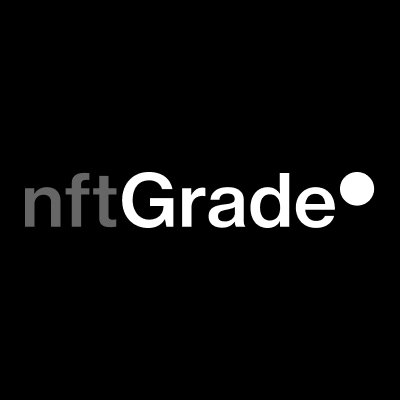
NFT Grade
NFT Grade is a service that provides a standardized, objective grading system for non-fungible tokens (NFTs), aiming to bring greater transparency and trust to the digital collectibles market. The company's mission is to create a reliable method for assessing the value and rarity of NFTs, similar to how physical collectibles like trading cards are professionally graded.
The core of NFT Grade's service is its proprietary algorithm, which analyzes the metadata of an NFT to determine its rarity and overall grade. This process takes into account various factors, including the individual traits of the NFT and their prevalence within the entire collection. The platform provides a detailed "Grade Card" for each assessed NFT, which includes an overall score, a breakdown of its trait rarities, and a unique serial number. This allows collectors and investors to make more informed decisions by providing a clear and objective measure of an NFT's value.
NFT Grade utilizes Hedera's high-throughput and low-cost infrastructure to create a secure and transparent record of its grading process. Each Grade Card is minted as an NFT on the Hedera Token Service (HTS), creating an immutable and auditable record of the grade.
Project Information
Related Projects

HashAxis is a global NFT marketplace built on the Hedera network, designed for buying, selling, and discovering digital collectibles and non-fungible tokens (NFTs). It leverages the Hedera Token Service (HTS) to mint, manage, and trade NFTs and is supported by the HBAR foundation.
A key advantage of HashAxis is its utilization of Hedera's low and predictable transaction fees, high-speed performance (capable of 10,000 transactions per second), and carbon-negative footprint. This makes creating, buying, and selling NFTs comparatively more accessible and environmentally friendly. HashAxis also supports native Hedera functionalities including “atomic swaps” for secure peer-to-peer trading and on-chain royalty payments, which provide automatic compensation to creators for secondary sales.
HashAxis integrates “Filecoin” for decentralized NFT storage and is one of the only NFT marketplaces to offer a streamlined, no-code interface for users to engage with digital collectibles across various categories, including art, profile pictures and more.

Hsuite is a comprehensive platform offering tools and services designed to enhance interaction and development on the Hedera network. It provides a unified user experience for individuals, developers, and businesses engaging with Hedera's distributed ledger technology (DLT).
The services include secure HBAR and HTS token management through integrated wallet functionalities, tools for the creation and administration of HTS tokens, and interfaces for deploying and interacting with Hedera Smart Contracts. Hsuite also provides non-fungible token (NFT) management, including minting and trading capabilities, alongside integrations for decentralized identity (DID) applications. For businesses, it offers payment gateway solutions to facilitate transactions using Hedera-based assets.
Hsuite’s streamlined common operations provide an entry for new users as well as robust resources for developers building applications on Hedera. Its flagship feature, Smart-Nodes, are highly customizable programs deployed inside virtual images which can be hosted and decentralized through cloud computing environments such as Google cloud and Amazon Web Services.
.png)
Neuron is a London-based company founded in 2019 that is building decentralised infrastructure for machine-to-machine (M2M) commerce. The company's vision is to create a secure and transparent ecosystem where autonomous devices, such as drones and AI agents, can directly discover, connect, and transact with each other without the need for centralised intermediaries.
Neuron's core product is a decentralised service network (DSN). This infrastructure includes a lightweight software development kit (SDK) that allows any machine, from a cloud server to a low-power device, to be onboarded as a "node." The platform also features an Explorer for nodes to discover each other, a Validator network to enforce service level agreements and machine reputation, and a system for automated, token-based payments. A primary use case is 4DSKY, a decentralized air traffic management system for drones, which has been successfully trialed with the UK government.
Neuron's entire platform is built on the Hedera network. It utilises Hedera's fast, secure, and low-cost distributed ledger technology as the foundational trust layer for its DSN. Specifically, Neuron uses Hedera's Consensus and Token Services for several key functions: to log and timestamp flight data from drones, to enable secure M2M payments.

Onchain Custodian is a centralized exchange headquartered in Singapore. It specializes in providing secure and compliant digital asset custody services tailored primarily for institutional clients including entities such as investment funds, family offices, and other financial institutions managing significant digital asset portfolios.
The core of Onchain Custodian's offering is a global, standardized, and resilient service focused on security, convenience, and regulatory adherence. Their solutions incorporate multi-signature wallets and advanced security protocols.
Onchain Custodian has previously partnered with firms such as IBM, Merkle Science and Accuity to enhance its compliance and transaction monitoring capabilities. As well as platforms including Apifiny and exchanges such as KuCoin and CyberBank. Additionally, it has provided custodian services for tokenization platforms such as Polymath.
It has also collaborated with PixelPlex to secure wealth management tools, CACHE for custody services related to gold-backed tokens, and secured partnerships with multiple blockchain ecosystems including Hedera, Neo, Ontology, and Zilliqa.
